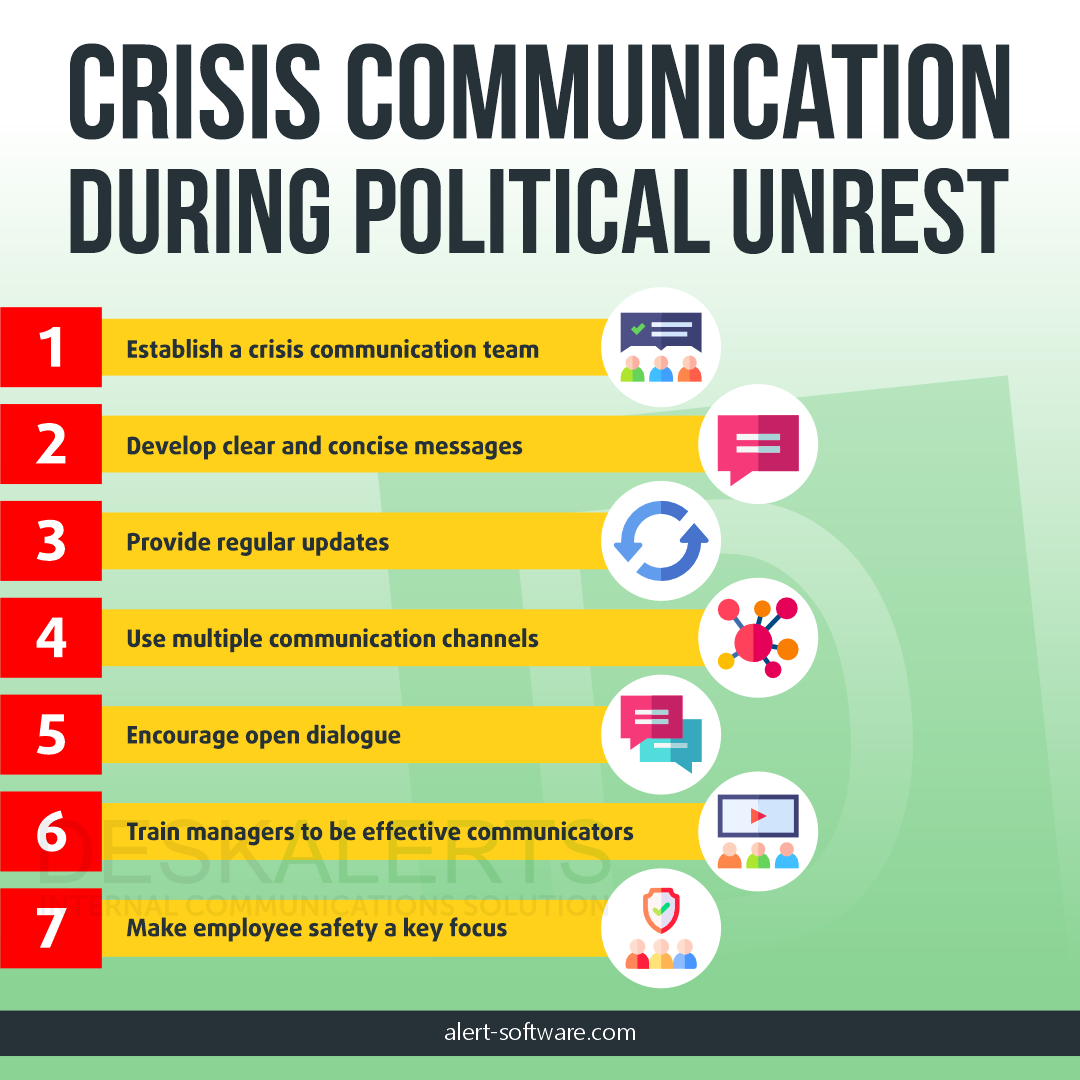
If you pay attention to the news, you’ll see that political unrest is a recurring issue being experienced all over the world. An analysis of risk data that examines conflict intensity, civil unrest and government stability by company Verisk Maplecroft found that political risk at the beginning of 2023 is at a five year high.
War, economic uncertainties, inflation, climate change, corruption, political scandals, human rights abuses, and other hardships are key drivers of most of the world’s political unrest right now. Navigating political unrest creates challenges for business operations for companies.
Table of contents
What is political unrest?
How does political unrest affect business operations
Why your business needs crisis communications in a polarized society
7 best practices for crisis communication during political unrest
What is political unrest?
The definition of political unrest is a state of turmoil and instability where significant portions of the population feel frustrated, marginalized, or oppressed, and they seek to change or express discontent. It can be driven by a wide range of factors, including social, economic, and political grievances.
Political unrest often manifests through protests, demonstrations, strikes, or other forms of collective action. The consequences of political unrest can vary, ranging from peaceful demands for reform and dialogue to more disruptive actions like civil disobedience or violent conflicts.
How does political unrest affect business operations?
Political unrest can have profound implications for businesses, affecting their operations, financial stability, and long-term viability. When a society experiences widespread protests, demonstrations, or social upheaval, the ripple effects can be felt throughout the business landscape. It is crucial for companies to understand these complexities so they can navigate the challenges and adapt their strategies accordingly.
Consequences of political unrest for business include:
- Road closures, curfews, and heightened security measures can make it difficult for employees to commute to work and for customers to access businesses.
- Reduced productivity, delayed deliveries, and temporary closures leading to financial losses.
- Damage to the business’s reputation if they are perceived to be aligned with controversial policies or implicated in social issues.
- A reduction in investor confidence resulting in volatile financial markets and decreased investments.
- The potential for increased regulations and government intervention can impact business operations, increase compliance costs, and introduce new market uncertainties.
- Potential supply chain issues when protests or demonstrations disrupt transportation networks or key infrastructure.
- Interruptions to the flow of goods and services can lead to shortages and increased costs.
Why your business needs crisis communications in a polarized society
In a society where divisions run deep and opinions are often passionately held, a crisis can easily escalate and exacerbate existing tensions. Effective communication becomes crucial in managing these situations - particularly for businesses.
During periods of political unrest, businesses can face significant challenges that can disrupt their operations and impact their reputation. In such situations, crisis communications play a crucial role in managing and mitigating the effects of political unrest. Here's why:
1. Employee safety and well-being
Effective Internal communications help support employees amidst political unrest by keeping them informed about the situation, providing guidance on safety protocol, and addressing their concerns.
2. Maintaining business continuity
It’s important to ensure that employees understand any changes to work arrangements, such as remote work options or altered schedules. Clear internal communications help minimize disruptions and keep essential operations running smoothly.
>> Learn more about business resilience strategies<<
3. Protecting the company's reputation
Crisis communications help businesses address external stakeholders' concerns, such as customers, partners, investors, government, and the media. It’s also crucial that internal communications are consistent with external messaging. By sharing timely updates, addressing questions, and providing transparent information, companies can protect their reputation and maintain trust.
4. Providing guidance and direction
Internal communication is essential for providing employees with clear instructions, guidance, and support on how to navigate potential challenges, adhere to company policies, and represent the organization appropriately during politically charged times.
5. Building employee morale and resilience
The use of transparent and empathetic internal communications practices can boost employee morale, foster a sense of unity and promote resilience during uncertain times. Regular updates, recognition of employees' efforts, and open channels of communication contribute to a sense of stability and support.
7 best practices for crisis communication during political unrest

When it comes to communicating with employees during challenging times marred by political unrest, you should follow these best practice tips:
1. Establish a crisis communication team
Form a dedicated team responsible for internal communication during civil unrest. This team should consist of representatives from various departments to ensure comprehensive and coordinated messaging across the organization.
2. Develop clear and concise messages
Create a central message that addresses the political unrest situation, reassuring employees about their safety and well-being. The message should be consistent and relayed through multiple channels, such as email, intranet, and internal memos.
15 Ideas Safety Message to Employees
3. Provide regular updates
Volatile situations such as political unrest can change quickly. Keep employees informed about the evolving situation and regularly share updates on any potential risks, security measures, or changes to operations. Promptly address any rumors or misinformation that may circulate internally.
4. Use multiple communication channels
You can more effectively reach employees when you deliver information using a variety of internal communication channels. This can include email, intranet, pop-up alerts, internal chat platforms, and text message alerts.
5. Encourage open dialogue
Foster an environment where employees feel comfortable expressing their concerns and seeking information. Encourage feedback, questions, and suggestions from employees and provide a designated channel for them to communicate with the crisis communication team.
6. Train managers to be effective communicators
Equip managers with the necessary skills and information to communicate with their teams during political unrest. Provide them with talking points, FAQs, and guidelines to ensure consistent messaging throughout your organization.
>>Read about DeskAlerts’ Employee Training Software<<
7. Make employee safety a key focus
It’s important to set employee safety as the top priority and communicate the steps being taken to protect them. Provide guidance on safety protocols, evacuation procedures, and emergency contact information.
***
Internal communication plays an important role in navigating the challenges posed by political unrest within organizations. During such turbulent times, effective internal communication becomes a lifeline for maintaining employee safety, ensuring business continuity, protecting the company's reputation, providing guidance, and fostering resilience. It enables organizations to keep employees informed, address their concerns and build a sense of stability and support.
FAQ:
What are the three major crisis strategies?
The three major crisis communication strategies are preparation, response, and recovery.
- Preparation involves proactive planning, risk assessment, and developing communication protocols.
- Response focuses on immediate actions to address the crisis, including timely and accurate communication, spokesperson training, and crisis monitoring.
- Recovery involves rebuilding trust, evaluating the effectiveness of the response, and implementing lessons learned to prevent future crises.
These strategies work together to effectively manage and mitigate the impact of a crisis.
What is the best way to communicate information in a crisis?
The best way to communicate information in a crisis is through clear, concise, and timely messaging:
- Use multiple channels, such as official statements, press releases, social media updates, and website notifications to reach a wide audience.
- Ensure accuracy and transparency in the information shared, addressing key concerns and providing practical guidance.
- Empathetic and compassionate communication, paired with active listening and responsiveness to stakeholder feedback fosters trust and helps manage the crisis effectively.
What makes a good crisis communication plan?
A good crisis communication plan is characterized by thorough preparation and a proactive approach. It includes:
- a clear chain of command
- designated spokespersons
- predefined communication channels
- strategies for rapid response, accurate information dissemination, and media relations
- scenario-based training
- guidelines for handling social media.
 Milana Graf
Milana Graf








